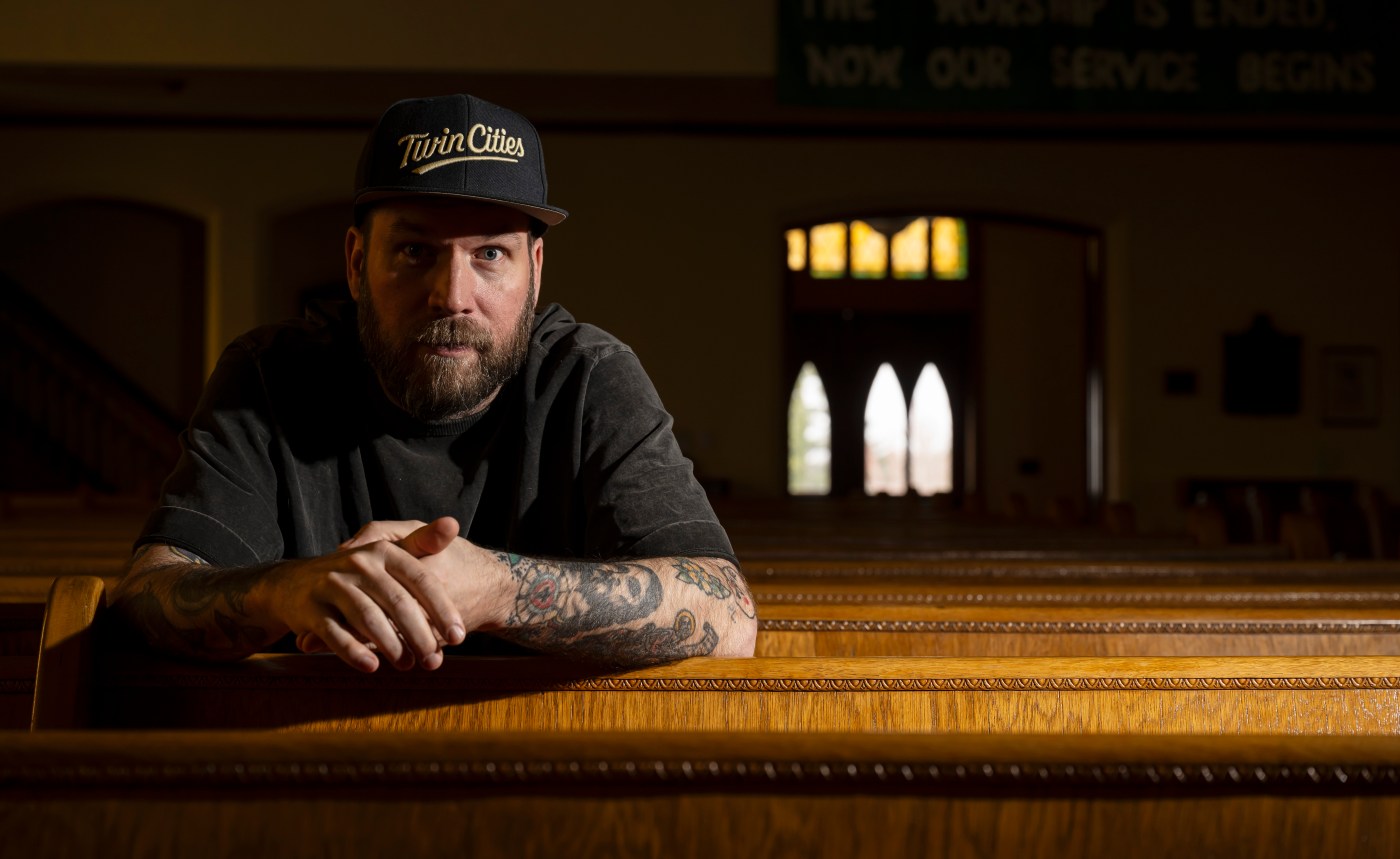
A Scandia pastor overcame addiction. Now he confronts the stigma in a podcast aimed at faith communities.
Seth Perry, the lead pastor at Elim Lutheran Church in Scandia, started smoking pot and drinking when he was 15. Within two years, he was regularly using cocaine.
Next came a diagnosis of bipolar 1, a disorder characterized by severe manic episodes that can last for several days or weeks. His first episode occurred during his senior year in high school after he stopped sleeping at night — “for eight days in a row,” he said.
Perry, who grew up in Vancouver, B.C., took a gap year after he graduated. He said he suffered from severe depression and was “non-compliant” when it came to taking his prescribed bipolar medication, but continued to use drugs. He then enrolled in Simon Fraser University, continued to use drugs throughout his time there, and had a major manic episode right around graduation, he said.
The drug use continued off and on throughout his 20s. On four separate occasions, he ended up in the psych ward of a hospital.
Perry, a self-proclaimed “trust-fund kid,” describes his life as a “frenzy” of alcohol, cocaine, benzodiazepines, marijuana and “tons of other party drugs that you could get at nightclubs at that time.”
Perry, 44, said he is alive today because he decided to get sober in April 2010 — before the fentanyl crisis hit. He was 29.
“My mom always says that she’s so grateful that I stopped using before the fentanyl crisis came because at the end of my use, I was using any powder I could get my hands on,” he said. “If that was me today, I wouldn’t be here. That’s my mom’s take on it, and I agree with her.”
‘Our Stigma’
Perry recently created a docuseries podcast called “Our Stigma,” which is designed to help faith communities develop meaningful mental-health outreach programs. The six-episode series was funded by Elim, M Health Fairview and the Washington County Opioid Settlement Council.
“Our Stigma,” which drops on Apple, Spotify, Amazon, YouTube and other major platforms on May 1, features interviews with faith leaders who are Somali, Hmong, African American and Native American discussing ways to confront the stigma of addiction and mental-health conditions. The series includes a study resource designed for faith communities to develop mental-health outreach programs.
The goal, Perry said, is for church groups to listen to the podcast series and come up with “one actionable step that they can take that is realistic.”
“The problem that I have seen is churches get excited about mental health, but have a scattershot outlook on what they can do in the future and then abandon the project because it was too unfocused, or they tried to take on too much,” he said. “This resource helps organizations make very simple, small steps in the right direction.”
On May 3, Perry will host “The Mental Health Faith Forum” at Trinity Lutheran Church in Stillwater. The event, which will run from 9 a.m. to noon, will include faith leaders, county and state officials, and diverse community representatives, including Native American, African American, rural American, Somali and Hmong groups.
Kody Green, a mental-health advocate, influencer and author, is the keynote speaker. Green, who grew up in La Crosse, Wis., lives with schizophrenia, is a recovering addict and was once incarcerated. “He brings a powerful perspective on resilience and recovery,” Perry said.
Funded by opioid settlement
Elim Lutheran Church received $9,000 in funding from the Washington County Opioid Settlement Council to produce the podcast and the forum, which are multicultural, multi-faith, BIPOC-inclusive, LGBTQIA+-inclusive and interdenominational in focus, said Rolando Vera, who is overseeing the opioid settlement process for Washington County Public Health & Environment.
“Seth is approaching this in the way that we all know we need to approach big problems: by bringing people together,” Vera said. “He has cast a whole all-encompassing, inclusive net over this entire project.”
Focusing on BIPOC- and LGBTQIA+-inclusive populations was particularly important to the council because “data shows that those populations are disproportionately affected by opioid use,” Vera said.
Related Articles
States push Medicaid work rules, but few programs help enrollees find jobs
Taking a mental health leave from work is an option most people don’t know about
After diagnosis, RFK Jr. comments, local entrepreneur to host Happy Hour for Adults with Autism
HealthPartners clerical workers ready to strike as negotiations stall
Video shows doctor with measles treating kids. RFK Jr later praised him as an ‘extraordinary’ healer
Perry is “building bridges across cultures, race and religion,” Vera said. “He’d done that through intensive trust, and he’s done that very intentionally. In public health, we say we work at the speed of trust. And that is exactly what Seth has done. It’s really impressive to see, in the upfront promotional materials, just the enormous diversity of perspectives that he’s been able to bring together.”
Elim Lutheran is one of eight organizations funded with $520,000 in opioid settlement funds this year. Other recipients include: YourPath, ShelettaMakesMeLaugh, WayMakers to Recovery, Wellshare International, Thrive!, Change the Outcome and Invisible Wounds Project.
Washington County officials expect to receive $11.5 million over the next 18 years in opioid-settlement funds. The county is expected to get most of its funding in the first five years and then receive 13 years of reduced payments; Vera anticipates the community council will award about $500,000 annually to opioid-mitigation efforts.
From recovery to seminary
Pastor Seth Perry talks about his battles with addiction. (John Autey / Pioneer Press)
Perry and his wife, Clarice Lundeen, live in downtown St. Paul and have two dogs: Boba, a beagle, and Morty, a greyhound. When he’s not working, Perry likes to cook, read pulp sci-fi novels and watch hockey.
He says he decided to attend seminary while he was going through recovery.
“People started to say, ‘You’ve got a good handle on the spiritual side of recovery. Have you ever thought of doing this?’” he said. “I was reluctant at first, but eventually it just became something that was a good fit for me.”
He received his master’s of divinity degree from Lutheran Theological Seminary in Saskatoon in 2019, and his first job as a pastor was at St. Mark’s Lutheran Church in Kingston, Ont. In August 2022, he was called to be lead pastor of Elim Lutheran.
The Bible story in Acts chapter 9, when Paul is on the Damascus road and is blinded by an encounter with the resurrected Christ, is particularly meaningful to Perry, he said.
“He is blinded and led by the hand back to Damascus. It takes three days to regain his strength,” he said. “This speaks to how a whole community of people helped me find recovery, and I am trying to do that with a diversity of faith partners in my work today.”
Kept secret
For years, Perry kept his past drug use and bipolar disorder a secret from the congregations he served. “I thought that people would judge me,” he said. “It wasn’t something people talked about in church.”
In February 2023, Perry started publicly sharing his story about his struggles with addiction and mental health. “I became the point person, the one that people were asking, ‘Can you speak at our church?’ ‘Can you help us educate people in our congregations?’” he said.
Perry, who serves a nearly all-white congregation, said he believes all faith communities need to learn about the racial and cultural disparities in mental-health and addiction treatments.
“They need to hear about it, think about it and reckon with it — and with their faith — and then come together and discuss why this is happening and what we can do,” he said.
The history of Scandia, founded by Swedish immigrants, “reflects the painful realities of addiction and mental illness, with generations of families affected by these struggles,” Perry said. “We’ve discovered a deep and complex history of addiction, mental illness, and, tragically, suicide — challenges that have impacted generations in this small rural community.”
Since February 2023, the congregation at Elim Lutheran, the city’s only church, has “worked to create a space for meaningful dialogue and mental healing,” he said. “It took two years to get this far, but we think we are being led by the Spirit.”
‘Mental Health Faith Forum’
Sober since 2010, Pastor Seth Perry recently created a podcast called “Our Stigma” and will host “The Mental Health Faith Forum” on May 3 at Trinity Lutheran Church in Stillwater. (John Autey / Pioneer Press)
Related Articles
World Tai Chi Day event returns to Stillwater on April 26
‘Know every move you’re making’: Stillwater prison inmates learn life lessons playing chess
William O’Brien State Park to unveil $5M in accessibility improvements
Athena Bitcoin asks Stillwater to repeal cryptocurrency ATM ban
HealthPartners opens new specialty center in Woodbury
What: “The Mental Health Faith Forum” is an event featuring faith leaders, local officials, community representatives and a variety of mental-health and addiction-related exhibitors. Kody Green, a mental-health advocate, influencer and author, will be the keynote speaker.
When: 9 a.m. to noon May 3
Where: Trinity Lutheran Church in Stillwater
Cost: The registration fee is $15 per person; special arrangements are available for individuals in recovery. Registration deadline is April 25.
Information: Go to ourstigma.com or email info@ourstigma.com.


